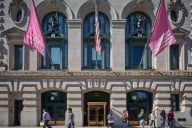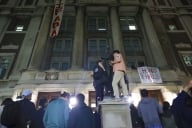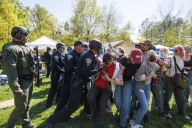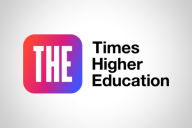You have /5 articles left.
Sign up for a free account or log in.
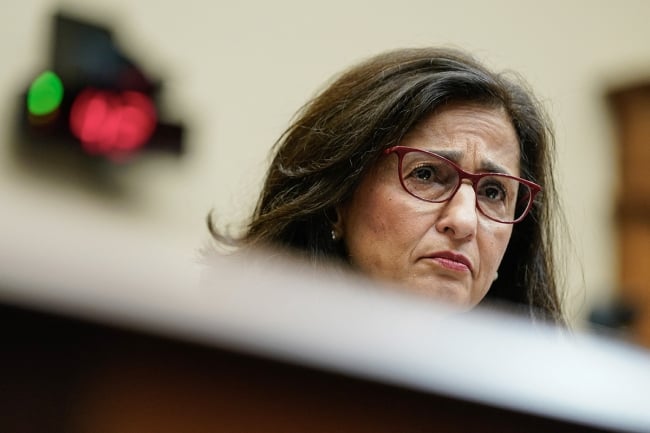
Minouche Shafik’s testimony to the U.S. House Committee on Education and the Workforce hasn’t gone over well with some.
Drew Angerer/AFP/Getty Images
The Columbia University president’s testimony during Wednesday’s congressional hearing on antisemitism didn’t immediately elicit the intense national criticism that other Ivy League presidents received after they spoke to the same U.S. House committee in December.
But the day after the hearing, one of the committee members who questioned her told Inside Higher Ed that Minouche Shafik “lied” in her testimony about a Columbia professor. Meanwhile, advocates for academic freedom accused the president of throwing “faculty and academic freedom under the bus.”
Much of the controversy stems from Shafik’s responses to questions from members of the Education and the Workforce Committee about individual faculty members who allegedly made antisemitic remarks. Asked about three professors and pressed on why they still work at Columbia, Shafik agreed with committee members that their speech crossed a line. She also said that some of them were being investigated, while another “will never teach at Columbia again.” Afterward, some Columbia faculty members said the president had failed to defend academic freedom and higher education more broadly.
Nor did Shafik completely mollify Republicans on the committee. Representative Tim Walberg of Michigan accused Shafik of “duplicity” in an interview Thursday with Inside Higher Ed. When he questioned the president Wednesday morning, Walberg brought up Joseph Massad, a tenured professor of modern Arab politics and intellectual history, by name, along with some of his alleged antisemitic rhetoric. After Shafik said that Massad had “been spoken to,” Walberg grilled her, suggesting that wasn’t punishment enough.
Asked by Walberg about Massad chairing an academic review committee, Shafik said “I believe, to answer your question, he is no longer a chair of that committee.” Later, when another committee member noted that Massad was still listed as chair, Shafik said she "wasn't sure."
After the hearing, Massad said in a statement Wednesday that he was still chair “for the next few weeks,” until the semester, and his normal chairmanship, ends. A Columbia spokesperson said Massad “has chaired his final meeting.” Massad also denied he had been rebuked by Columbia leaders. And although Shafik told the committee that he was under investigation, the professor said that was "news" to him.
“She lied to us,” Walberg told Inside Higher Ed. He tempered his accusation a bit, saying Shafik might have just been unprepared for questions she should’ve been prepared for. Either way, she is “trying to play both sides in a very poor way,” he said, adding that “Jewish students don’t feel safer today than they felt yesterday.”
Committee Chair Virginia Foxx, a North Carolina Republican, issued a statement Thursday that also questioned the veracity of Wednesday's testimony. Though Foxx didn’t get into specifics, she wrote that “the committee has serious concerns regarding misleading and inaccurate statements from yesterday’s testimony, including the university’s response to antisemitic conduct by students and faculty, and is committed to uncovering the truth and ensuring accountability."
Shafik may escape the fate of the Harvard and University of Pennsylvania presidents who resigned in the wake of their widely panned testimony on campus antisemitism. But at what cost to faculty members’ perceptions, or to the state of academic freedom at Columbia and across academe? “I would view her performance as self-serving and career-saving as opposed to what higher education requires of her, which is a robust defense of academic freedom in service of democracy,” said Irene Mulvey, president of the American Association of University Professors.
Mulvey called lawmakers’ questions “unfair and political,” and said they included misquotes and misrepresentations. But she said the “questions are what they are—[Shafik’s] answers threw faculty and academic freedom under the bus and may not even have been true.”
Alex Morey, director of Campus Rights Advocacy for the Foundation for Individual Rights and Expression (FIRE), a free-speech organization, said that after Wednesday’s hearing, “I would be really worried if I were a faculty member at Columbia … you’ve got the president, you know, ratting out members of the faculty to Congress for what appears to be protected speech.” She said Columbia should be teaching students to have productive discourse “instead of playing censorship Whac-a-Mole as Congress’s puppet.”
Helen Benedict, a professor at the Columbia Journalism School, said that Wednesday’s hearing “was extremely alarming in terms of academic freedom and everything that education ought to stand for in a democracy.” Columbia is supposed to be “a self-governing organization,” she said, where if a faculty member has “done something distressing, we look into it ourselves—we don’t do it at the behest of Congress.”
“In the American democracy, Congress isn’t supposed to tell campuses who they must fire, who they can hire—it’s none of their business, we do this for ourselves,” Benedict said. “And this happens in other countries with autocracies, but it’s not supposed to happen here. It’s a private university to boot.”
Benedict said she had just come from witnessing New York police clearing a pro-Palestinian protest from campus, which included the arrests of many students involved. Shafik had given police the go-ahead to clear the encampment. “It was hard not to think she was doing this to further appease the congresspeople who interrogated her yesterday,” Benedict said.
Marianne Hirsch, a Columbia professor emerita of English and comparative literature and of the Institute for the Study of Sexuality and Gender, said investigations of professors are usually confidential. “This is shocking, I’ve never experienced it before and I’ve been in academia for 50 years,” Hirsch said. “She really did not have to concede, nor did she have to align herself with this right-wing agenda.”
Walberg, though, said Jewish students at Columbia are fearing for their lives, “and that’s not a diverse academic climate that we want to foster.” He said he believes “in dissent, in debate, in disagreement … but in the end it has to be civil and it can’t intimidate.” Columbia declined to provide an interview Thursday with Shafik or another university representative.
Naming Names
A few Columbia professors' names featured in the committee’s questioning. None returned Inside Higher Ed’s requests for comment Thursday.
One was Mohamed Abdou, a visiting professor in modern Arab studies who Shafik said is “grading his students’ papers and will never teach at Columbia again.” It is unclear whether Abdou was fired, or whether his contract is expiring without reappointment. It's also unclear why he’s leaving and who made that decision. “As far as I know, we have processes and procedures for hiring, we have groups that are authorized to hire and investigate and possibly sanction faculty to evaluate teaching, evaluate scholarship, we have proceedings for that,” Hirsch said.
Massad, who has long courted controversy for his views on Israel, received the most attention. He has been widely criticized for an article he wrote the day after Hamas’s Oct. 7 attack on Israel in The Electronic Intifada.
It was titled “Just another battle or the Palestinian war of liberation?” Walberg called out specific words Massad used, including calling the attack “awesome.” In the article, Massad used that word in this sentence: “No less awesome were the scenes witnessed by millions of jubilant Arabs who spent the day watching the news, of Palestinian fighters from Gaza breaking through Israel’s prison fence or gliding over it by air.”
Walberg told Inside Higher Ed that “I as president would say, ‘You’re fired, we’ll meet you at the tenure board, but you’re fired.’”
During the hearing, Shafik revealed that Massad was being investigated. “I’m appalled by what he’s said,” Shafik told the committee. “He has been spoken to.”
Massad then said he wasn’t aware of the investigation. Complicating things further, the Forward, a Jewish publication, published a screenshot Wednesday of what it said was a confidential document provided to the House committee. The document said there was an ongoing investigation into Massad over an Oct. 8 article, and “this investigation is underway, though the faculty member has not yet been formally noticed.”
Also Wednesday, The Electronic Intifada published a statement from Massad rebutting what Shafik had said about him. “I remain the chair of the Academic Review Committee, a one-year position, for the next few weeks, which is the normal end of my chairmanship,” he wrote. He wrote that Shafik “misconstrued what happened when she stated that I was ‘spoken to,’ by my chair and my dean, implying that I was reprimanded … neither the executive vice president nor my chair reprimanded me about my article nor accused me of praising the attack.” Neither of the executive vice president nor Massad's chair responded to Inside Higher Ed to confirm or deny his account.
“If that’s the talking-to that he got, he wasn’t talked to in the way that we would assume that to be the case,” Walberg said. He said Massad “certainly hasn’t been dealt with.”
In Columbia’s only comment to Inside Higher Ed Thursday, a spokesperson sent an email saying “Professor Massad has chaired his final meeting of the academic review committee. As President Shafik said, he is under investigation. As a general matter, if the university receives a formal complaint, it will review and consider the complaint under established processes.”
Morey, with FIRE, said Shafik’s statements Wednesday mean that “basically all pro-Palestinian students and faculty at Columbia are on notice.” She expressed concern about Columbia telling Congress about Massad’s investigation before informing him. “They’re turning this information over” to what’s “effectively a modern-day HUAC,” she said, using the acronym for the McCarthy-era House Un-American Activities Committee.
Columbia’s leaders, she said, “look scared, like they are cracking down on protected speech because Congress wants them to, and that is not OK.”

